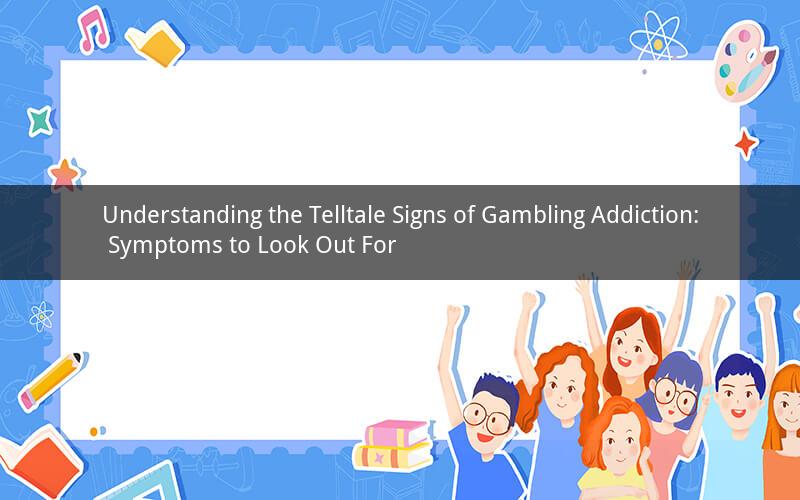
Gambling addiction, also known as problem gambling or compulsive gambling, is a serious condition that affects millions of individuals worldwide. Identifying the symptoms of gambling addiction is crucial in seeking timely intervention and support for those struggling with this problem. This article delves into the common signs and symptoms of gambling addiction, helping readers recognize the potential warning signs in themselves or others.
1. Preoccupation with Gambling
One of the hallmark symptoms of gambling addiction is a preoccupation with gambling. Individuals may constantly think about gambling, even when they are not actively engaging in it. This preoccupation can manifest as dreams about gambling, discussing gambling strategies, or spending a significant amount of time planning or organizing gambling activities.
2. Inability to Control Gambling
Gamblers with an addiction often find it challenging to control their gambling behavior. They may make repeated unsuccessful efforts to stop or reduce their gambling, despite promising themselves otherwise. The urge to gamble can become overpowering, leading to a loss of control and a compulsion to keep playing, regardless of the consequences.
3. Loss of Interest in Other Activities
As the addiction progresses, individuals may start to lose interest in activities that they once enjoyed. Their focus shifts solely to gambling, causing them to neglect work, hobbies, social relationships, and even self-care. Friends and family members may notice a decrease in their loved one's participation in previously cherished activities.
4. Emotional and Behavioral Changes
Gambling addiction can lead to a range of emotional and behavioral changes. Individuals may experience mood swings, irritability, anxiety, depression, and aggression. They may also engage in risky behaviors, such as driving under the influence or taking part in illegal activities, to support their gambling habit.
5. Financial Struggles
Gambling addiction often results in significant financial difficulties. Individuals may experience financial strain due to their gambling debts, which can accumulate rapidly. They may go to great lengths to borrow money or sell valuable possessions to fund their gambling habits, leading to a downward spiral of debt.
6. Lying and Secrecy
Gamblers with addiction may develop a tendency to lie or be secretive about their gambling activities. They may hide their gambling behavior from family, friends, or even their own spouse. Lying becomes a way to protect themselves from the consequences of their actions and to maintain the illusion of control over their gambling.
7. Relationship Problems
Gambling addiction can strain relationships, leading to conflicts, arguments, and even the breakdown of families. Individuals may become neglectful of their loved ones, failing to fulfill their responsibilities as a partner, parent, or friend. The addiction may also lead to emotional and physical abuse.
8. Continued Gambling Despite Consequences
One of the most telling signs of gambling addiction is the continued engagement in gambling despite negative consequences. Individuals may continue to gamble, even when they are aware of the harm it is causing to themselves and others. This inability to stop gambling, despite the adverse outcomes, is a hallmark symptom of addiction.
9. Withdrawal Symptoms
Similar to other addictions, gambling addiction can cause withdrawal symptoms when the individual tries to stop or reduce their gambling. These symptoms may include irritability, anxiety, restlessness, insomnia, and depression. In some cases, individuals may experience physical symptoms such as headaches or stomachaches.
10. Seeking Help
Recognizing the symptoms of gambling addiction is the first step towards seeking help. If you or someone you know is experiencing any of the aforementioned signs, it is essential to seek professional assistance. Treatment for gambling addiction can take various forms, including therapy, counseling, support groups, and sometimes medication.
Frequently Asked Questions (FAQs) about the Symptoms of Gambling Addiction:
Q1: What is the main difference between problem gambling and gambling addiction?
A1: The main difference lies in the severity of the symptoms. Problem gambling refers to a pattern of gambling that causes distress or harm, while gambling addiction involves a more severe level of preoccupation, control loss, and negative consequences.
Q2: Can anyone develop a gambling addiction?
A2: Yes, anyone can develop a gambling addiction, regardless of age, gender, or socioeconomic status. However, certain factors, such as a family history of addiction, mental health disorders, and certain personality traits, may increase the risk.
Q3: How can I tell if someone is struggling with gambling addiction?
A3: Look for signs such as preoccupation with gambling, loss of control, financial difficulties, emotional and behavioral changes, lying and secrecy, relationship problems, and continued gambling despite consequences. If you suspect someone is struggling with addiction, encourage them to seek professional help.
Q4: Is there a cure for gambling addiction?
A4: While there is no guaranteed cure for gambling addiction, it is a treatable condition. With the right combination of therapy, counseling, support groups, and lifestyle changes, individuals can overcome their addiction and lead a fulfilling life.
Q5: Can gambling addiction be prevented?
A5: While it is not possible to completely prevent gambling addiction, there are steps individuals can take to reduce their risk. These include setting a budget for gambling activities, avoiding risky behaviors, seeking support from friends and family, and being aware of the signs of addiction.